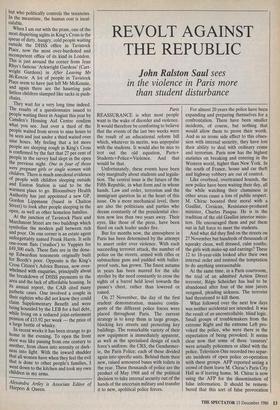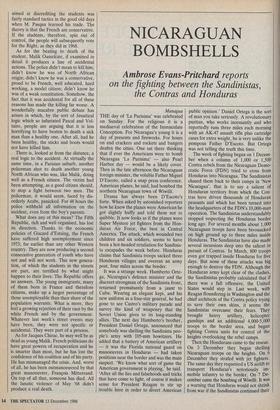REVOLT AGAINST THE REPUBLIC
John Ralston Saul sees
in the violence in Paris more than student disturbance
Paris REASSURANCE is what most people want in the wake of disorder and violence. It would therefore be comforting to believe that the events of the last two weeks were the result of an educational reform bill which, whatever its merits, was unpopular with the students. It would also be nice to trot out the old equation, Paris+ Students+ Police= Violence . And that would be that.
Unfortunately, these events have been only marginally about students and legisla- tion. The central issue is the future of the Fifth Republic, in what form and in whose hands. Law and order, terrorism and the immigrant question lie at the heart of this issue. On a more mechanical level, there are also the politicians and parties who dream constantly of the presidential elec- tion now less than two years away. Their eyes, like those of the press, have been fixed on each leader under fire.
But for months now, the atmosphere in Paris has been determined by the attempt to assert order over violence. With each succeeding terrorist attack, the number of police on the streets, armed with rifles or submachine guns and padded with bullet- proof vests, has grown. The finest autumn in years has been marred for the idle stroller by the need constantly to cross the sights of a barrel held level towards the passer's chest, rather than lowered or raised.
On 27 November, the day of the first student demonstration, massive contin- gents of the different police forces were placed throughout Paris. The current strategy is to keep them in large groups, blocking key streets and protecting key buildings. The remarkable variety of their new equipment is immediately apparent, as well as the specialised design of each force's uniform: the CRS, the Gendarmer- ie, the Paris Police; each of these divided again into specific units. Behind them their new, raised armoured buses with toilets in the rear. These thousands of police are the product of May 1968 and of the political decision to take internal security out of the hands of the uncertain military and transfer it to new, apolitical police forces. For almost 20 years the police have been expanding and preparing themselves for a confrontation. There have been smaller incidents, of course, but nothing that would allow them to prove their worth.
And as an ironic side effect to this obses- sion with internal security, they have lost their ability to deal with ordinary crime and terrorism. Paris now has the highest statistics on breaking and entering in the Western world, higher than New York. In the south of France, house and car theft and highway robbery are out of control.
Like overbred, overtrained hounds, the new police have been waiting their day, all the 'while watching their clumsiness in other areas cause a loss of public respect.
M. Chirac boosted their moral with a Gaullist, Corsican, Resistance-produced minister, Charles Pasqua. He is in the tradition of the old Gaullist interior minis- ters. He encouraged them and put them out in full force to meet the students.
And what did they find on the streets on 27 November but hundreds of thousands of squeaky clean, well dressed, calm youths; the girls with make-up and earrings? These 12 to 18-year-olds looked after their own internal order and resisted the temptation to do anything unreasonable.
At the same time, in a Paris courtroom, the trial of an admitted Action Direct terrorist, Regis Scheicher has had to be abandoned after four of the nine jurors resigned, pleading sickness. The terrorist had threatened to kill them.
What followed over the next few days was neither accidental nor intended. It was the result of an uncontrollable, blind logic.
Small groups of troublemakers from the extreme Right and the extreme Left pro- voked the police, who were there in the expectation of being provoked. It seems clear now that some of these `casseurs' were actually policemen or allied with the police. Television One recorded two separ- ate incidents of open police co-operation with these groups. AFP reported seeing a crowd of them leave M. Chirac's Paris City Hall as if leaving home. M. Chirac is now suing the AFP for the dissemination of false information. It should be remem- bered that this sort of false provocation aimed at discrediting the students was fairly standard tactics in the good old days when M. Pasqua learned his trade. The theory is that the French are conservative. If the students, therefore, spin out of control, the people will subsequently vote for the Right, as they did in 1968.
As for the beating to death of the student, Malik Oussekine, if examined in detail it produces a line of accidental actions. The police didn't mean to kill him; didn't know he was of North African origin; didn't know he was a conservative, proud to be French, well educated, hard working, a model citizen; didn't know he was of a weak constitution. Somehow, the fact that it was accidental for all of these reasons has made the killing far worse. A wonderfully macabre public debate has arisen in which, by the sort of Jesuitical logic which so infuriated Pascal and Vol- taire, people are arguing that it is less horrifying to have beaten to death a sick man than a healthy one. After all, had he been healthy, the sticks and boots would not have killed him.
There is, looked at from the distance, a real logic to the accident. At virtually the same time, in a Parisian suburb, another policeman shot to death another young North African who was, like Malik, doing well as a French citizen. The victim had been attempting, as a good citizen should, to stop a fight between two men. The policeman, it would seem, faced by dis- orderly Arabs, panicked. For 48 hours the police withheld all information on the incident, even from the boy's parents.
What does any of this mean? The Fifth Republic, rich and well organised, has lost its direction. Thanks to the economic policies of Giscard d'Estaing, the French have suffered high unemployment since 1973; far earlier than any other Western country. They are now producing a second consecutive generation of youth who have• not and will not work. This new genera- tion, of which the students in the streets are part, are terrified by what might happen to their lives. The Republic offers no answers. The young immigrants, many of them born in France and therefore citizens, make up a larger percentage of those unemployable than their share of the population warrants. What is more, they feel a growing rejection of their race by the white French and by the government. Whatever last week's street events may have been, they were not specific or accidental. They were part of a process.
As for Jacques Chirac, he may well be as dead as young Malik. French politicians do have great powers of recuperation and he is smarter than most, but he has lost the confidence of his coalition and of his party.
He has mismanaged the crisis. And, worst of all, he has been outmanoeuvred by that great manoeuvrer, Francois Mitterrand.
On top of all that, someone has died. All the lunatic violence of May '68 didn't produce a real death.



































































 Previous page
Previous page